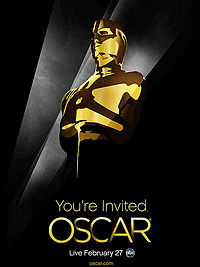 Once the 83rd Academy Awards nominations were announced, entertainment media types and movie fans alike began their annual winner predictions. As for myself, I’m not one who cares much who wins what. But I do like to speculate on which movie nominees will produce the most knockoffs in the year or two that follow.
Once the 83rd Academy Awards nominations were announced, entertainment media types and movie fans alike began their annual winner predictions. As for myself, I’m not one who cares much who wins what. But I do like to speculate on which movie nominees will produce the most knockoffs in the year or two that follow.
While imitation is said to be the sincerest form of flattery, nowhere might this be more evident than in the film industry. In spite of the fact that the copycats are seldom as good as the originals, that’s never stopped movie execs from cranking out movies that try to ride on the coat tails of the box office blockbusters. Perhaps it’s only because the examples are so publicly accessible, that it’s led me to believe that the movie business has the worst marketing of any American industry.
The outstanding success of the Lord of the Rings trilogy immediately comes to mind. Not only did the three films pull in 17 Academy Awards, they were a huge financial success. What followed were a handful of forgettable films involving a variety of wizards, quirky species in various semi-human form, fantastic monsters, quasi-magical medieval weapons all wrapped in some ponderous pseudo folklore. The end result had all the epic adventure of a Friday night Dungeons and Dragons tournament.
I think I have a good theory that explains why the Hollywood corporate suits always think they can duplicate the success achieved by other films. I recently finished reading “War in the Boardroom” by Al and Laura Ries. Part of the book’s premise is that there’s a distinct divide between Creative and Management. While Creatives employ the “right-brain” faculties of intuition, visual thinking and subjective ideas, Management prefers a “left-brain” approach that is analytical logical and objective. They live and work in two different worlds.
When Steven Spielberg makes a successful film, he doesn’t consult demographic profiles or statistical charts. He takes his vision and transforms it into a compelling story that captures the imagination of the movie going public. Spielberg intuitively knows how to grab an audience. Then Hollywood steps in and makes the mistake of trying to duplicate that cinema magic by rearranging the elements by some rote formulaic process that has all of the right components but none of the creativity. The result is almost always mediocre.
So the question remains: What can we expect from Hollywood in the months to come? The answer is simple if you just think like a movie industry marketing exec. Chances are the next movie clone will be a computer animated science fiction fantasy starring Jeff Bridges and Natalie Portman who play vampires that fly around on broomsticks while meeting dragons, talking toys, and King George VI. Who thought movie making could be this easy?
Oh, and by the way, don’t forget to bring your 3-D glasses.

Be the first to comment